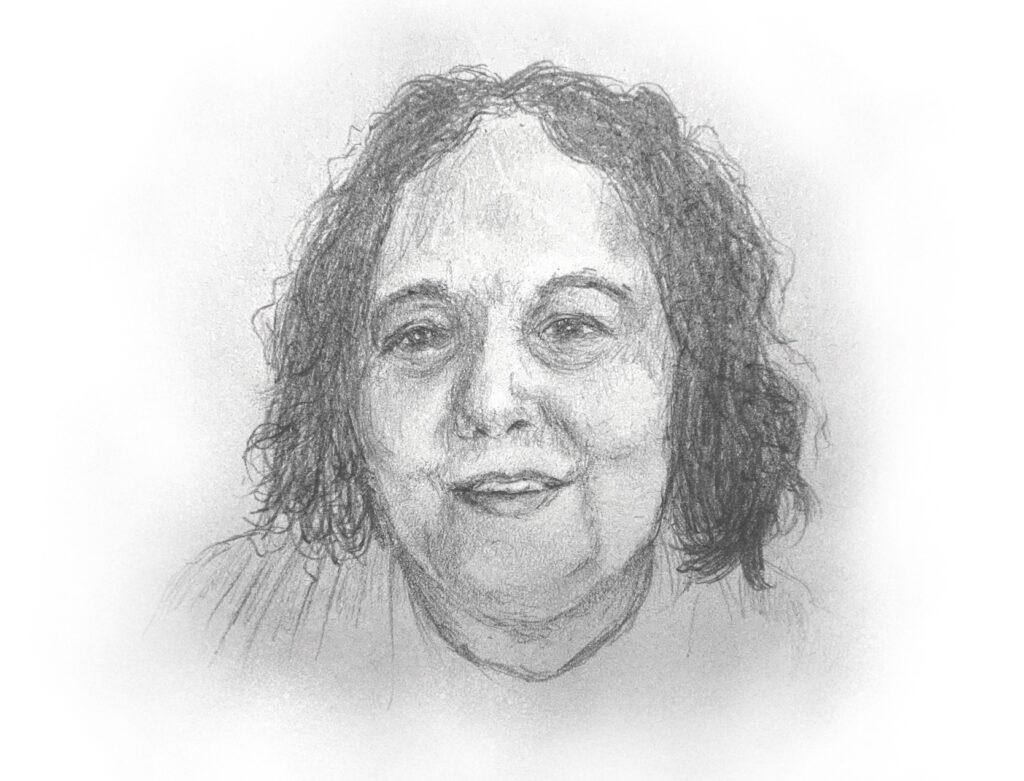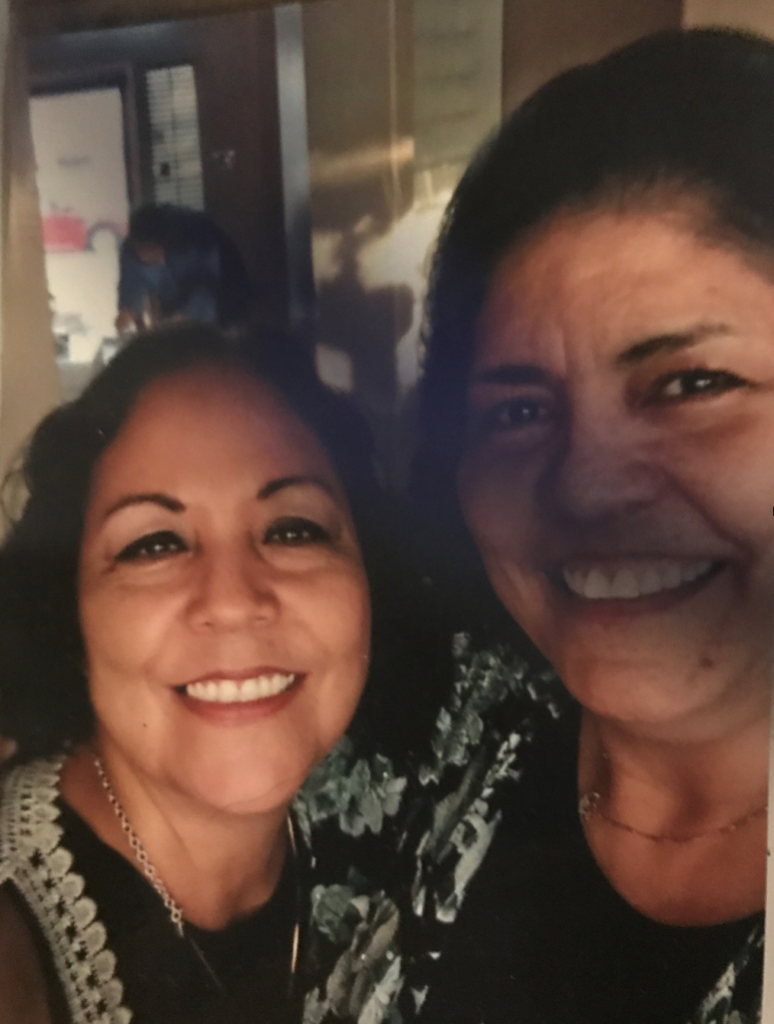Dreaming of following her father’s footsteps into a decadeslong military career, Rachel Faili began her service in the U.S. Army in earnest in the fall of 1976.
But the daily sexual harassment she quickly experienced in her male-dominated unit led her to cut her service short two years in. Still determined to follow her dreams, Faili went to college to get her nursing degree and reentered the Army in 1984 as an officer and registered nurse. But another incident — this time a sexual assault by a surgeon — triggered compounded trauma from her previous experience in the Army while creating new trauma, leading her to end her military career for good.

Rachel Faili
Over the next four decades, the aftermath of this military sexual trauma only continued to rear its ugly head. Faili turned down a promotion. She changed her name. And her post traumatic stress disorder got so bad that it altered her personality — ruining her relationship with her family. Finally, in 2019, after decades of living with undiagnosed PTSD, Faili contemplated suicide.
Faili, based in Houston, applied for PTSD disability benefits four separate times on her own with the U.S. Department of Veterans Affairs. They denied her each time.
Last summer, her circumstances changed.
A team of lawyers from Sidley Austin agreed to represent Faili pro bono after Houston Volunteer Lawyers (the pro bono arm of the Houston Bar Association) referred Faili’s case to them. After roughly 200 pro bono hours, which included interviewing Faili multiple times, interviewing Faili’s sister, tracking down an old coworker, going through Faili’s medical records, crafting a narrative and writing a detailed, 20-page supplemental claim, the Sidley team secured benefits for their client this July when the VA issued a decision granting their request.
“I didn’t tell my story for over 41 years and it was eating me alive, and I just didn’t know what to do,” Faili told The Texas Lawbook in a recent interview. “I was on the verge of suicide; it was that drastic. For [the Sidley team] to take the time and be diligent about my case … and right [all] the wrong that had been done to me was everything to me, and I am forever grateful to them.”
Faili’s case aligned perfectly with Sidley’s Veterans Advocacy Project, which provides pro bono legal assistance to disabled veterans seeking benefits and compensation from the VA, including medical retirement benefits and combat-related special compensation. In 2022 alone, Sidley lawyers and staff handled more than 115 matters and four class action lawsuits, totaling more than 10,000 pro bono hours for veterans.
Faili’s pro bono team at Sidley included transactional/regulatory associate Robert Uhl and M&A associate Micaela Hannah out of the firm’s Dallas office and pro bono counsel Emily Wexler, who is based in Sidley’s Chicago office and coordinates the firm’s Veterans Advocacy Project.
Uhl, who regularly handles pro bono work for veterans, said the time lawyers can give to help veterans pales in comparison to the sacrifices they’ve made — both for the country and in their own lives that are put “on hold” while keeping “us safe.”
“As attorneys, we already owe a duty to give back to the country and to the state, and so it’s even more powerful to give back to people like Rachel who have given a lot to the country [by serving] in the military,” Uhl said. “We get to sit in these nice offices, and people like Rachel who are on the front lines are going through really difficult situations. … So it feels like a really small way to give back.”
Wexler agreed.
“It’s gratifying that people who have made so many sacrifices are thanking us,” she said. “It just doesn’t feel right almost. I feel grateful for the things that veterans do for us as a society, and I’m really grateful that the firm is behind the project and is willing to put so many resources into it. It’s our honor to help these veterans.”

Micaela Hannah
‘I live a very guarded life’
While growing up in Houston in the 1970s, Faili was an honor student, candy striper at the local VA hospital and often the primary caretaker of her six younger siblings. She dreamed of becoming a registered nurse and serving for 20 years in the military, like her father.
Faili enlisted under her given name, Sarah Mae Rojas, in 1976 at age 18. After completing boot camp at Fort Jackson in Columbia, South Carolina, she began her Army career as a generator mechanic stationed at Fort Polk in Louisiana.
While at boot camp, according to the supplemental claim for service-connected disability that Sidley submitted in May on her behalf, one of the instructors asked Faili’s group whether any of the female recruits were virgins, “ostensibly for purposes of assigning housing.” After Faili and one other female said they were, “the inquiring drill instructor thought it was comical they were virgins and grouped them together.”
The stigma followed Faili to Fort Polk, and she experienced a “constant onslaught of demoralization and horrendous acts, unwanted sexual attention and endless taunts for being a virgin” from men at all ranks — from enlisted to officers to even the commanding officer, the supplemental claim said. The commanding officer tried to bribe her into having sex with a trip on his private plane for lunch, while another officer offered her an apartment in exchange for sex. Another solider went further with another “B” word — blackmail — pasting a photo of Faili’s head on the body of a pornographic image and threatened to send the altered photos to her family if she didn’t agree to have sex with him, while someone else used the “B” word, placing a sign that said “Bitch” on her workstation.

Paul Rojas, who served in the Air Force for 20 years.
“It was just a debasing experience when I was enlisted as a private, and there was just a barrage of sexual innuendo and sexual attacks that were verbal and then very, very graphic and very painful to me,” Faili told The Lawbook.
She became anxious, depressed and in constant fear of being attacked, which led her to also become aggressive and tense. Seeing no way out of her situation other than suicide or getting pregnant, Faili met a fellow soldier who provided her some protection, married him and got pregnant, which led to her honorable discharge in 1978.
That same year, she also changed not only her last name to match her husband’s, but her entire name — from Sarah Mae Rojas to Rachel Marie Suarez — in an attempt to “present herself in a more commanding way, with a name that would prevent others from seeing her as a small-town, virgin young girl,” the supplemental claim said. She eventually changed her last name again to Faili when she remarried.
Holding faith for a better military experience, Faili reenlisted in the Army as a first lieutenant in 1984 after earning her bachelor of science in nursing from Towson University in Maryland. She was stationed at Walter Reed National Military Medical Center in Washington, D.C., as a registered nurse.
All was well for a few years. Faili excelled in her position and worked her way up to charge nurse at her unit, overseeing all patient care and supervising the nurses, technicians and other staff. She received glowing annual performance reviews and was on the brink of getting promoted.
But a couple of months before Faili’s contract was up for renewal, she was sexually assaulted by a male doctor.
“A fellow officer — a doctor — came into the room … [and] came behind me and pressed his private parts against me when I was bending over, caring for a patient,” Faili said. “He had a different mindset and a different agenda being in the room with me than checking on the patient, and it was very, very traumatizing to me. He was very jovial about it … and went about his way. I didn’t know who he was. I didn’t know anything about the person. All I knew is that I just felt so much shame.”
Faili’s mental health again suffered from the trauma.
“This sexual assault exacerbated the harm to her mental health caused by repeated sexual harassment at Fort Polk,” the supplemental claim said. “She again began to feel unsafe in enclosed spaces like patients’ rooms, became even more distrustful around men, and was even more hyper vigilant. Just like at Fort Polk, she developed trouble sleeping, fears of being violated again and perceived a constant threat to her safety. She was ashamed and felt like nobody on the floor respected her.”
Faili was offered a promotion to captain with her service contract renewal, but she turned it and the renewal down, swearing off active-duty military life for good. Faili moved back to Texas to work in the VA system.
Faili later moved into the private sector, including working as a teacher, Uhl said, but because of her PTSD and the coping mechanisms she has employed to deal with her trauma, she has struggled with holding jobs and maintaining her relationships.
More specifically, her coping mechanisms for the PTSD have included being over-vigilant, hyper-aware of her surroundings, and remaining aggressive and tense, the supplemental claim said. She also has an intense fear of working in predominantly male environments or working with strangers, and has “great anxiety of the mere thought of leaving the safety of her home.” Everyday life has been a struggle because “even the smallest tasks require significant amounts of energy and focus that [she does] not have,” the claim says.
Faili has created distance from her family, including her two sons and her siblings, and she has avoided family gatherings with the belief that her relatives wouldn’t understand why she is so depressed and withdrawn.
“I live a very guarded life,” Faili said, “which is fine because it is where I am comfortable.”
‘I should have a [U.S.] flag for the death of the person I used to know’
Someone Faili has begun recovering a relationship with is her younger sister, Rebecca Rojas. Due to her inability to hold a job, Uhl said, Faili ended up “homeless to the point that her sister found her living in a barn in Houston” during Winter Storm Uri in 2021 and pulled her out of that situation.
“Her sister is really to credit for bringing her back into the fold and into her home,” Uhl said.
After Faili talked about her traumatic military experiences with Rojas, an Air Force veteran, Faili was inspired to apply for VA benefits, Uhl said. She applied for the first time in June 2019 and was denied, even as she contemplated suicide two months later. Between 2019 and 2021, she reapplied three more times on her own but never succeeded due to insufficient detail.

Faili and her sister, Rebecca Rojas
“I was a complete failure trying to represent myself,” Faili said. “I didn’t explain what had happened to me regarding PTSD and why I was claiming PTSD, and of course because I left the pages blank — not knowing who was going to read my personal story and why I should divulge all that personal information to a blank piece of paper — I was denied.”
It was no help, Faili added, that the forms themselves are so “precise.”
“Someone has to have knowledge in what the VA is actually asking for to win a claim, because it’s very confusing,” Faili said. “It’s just a lot of pressure on the veteran who does not have a lawyer.”
During her September 2019 suicidal ideation, Faili called 911 and was admitted into the hospital. In January 2020, after running short on her antidepressants (which were helping prevent suicidal thoughts), she called the Veteran Crisis Line and was admitted to the emergency room. She later received a full suite of tests and evaluations at Houston’s Michael E. DeBakey VA Medical Center, which led to her PTSD diagnosis.
By the time Sidley got involved last summer, the VA had acknowledged Faili had a diagnosis, Wexler said, but the legal team still had to prove to the VA that there was “enough evidence of an incident or injury” during Faili’s time in the military and that the injury was connected to the current PTSD diagnosis.
“That was the part that was missing: What happened during service and how did that lead to the problems today? That’s where we focused our energy,” Wexler said.
Wexler, Uhl and Hannah got to work. They first interviewed Faili at length multiple times to get her full story. By this point she had been getting treatment for her PTSD long enough to feel more comfortable talking about her experiences.
“I think our first conversation was an hour or two hours, and she poured her heart out to us,” Uhl said. “It wasn’t a challenge to get her to open up, but that’s the kind of hurdle that she had to overcome on her own and to be comfortable sharing what I’m sure were very, very painful memories for her.”
The lawyers mapped out what they thought happened, what Faili said had happened and began the work of substantiating the narrative with other evidence in her record and people who could corroborate the evidence. They scoured Faili’s military records and medical records, including her PTSD evaluation and comments she had made to her doctors about the incidents that caused her PTSD. They tracked down a nurse who had worked with Faili at Walter Reed, successfully reaching her on a cold call, Uhl said.
Finally, they talked with Faili’s sister, Rebecca Rojas, who significantly helped the lawyers craft their argument in the supplemental brief that Faili’s military experience had fundamentally changed who she was. Before the Army, Rojas told the lawyers, Faili was “a sweet, beautiful, kind, loving and caring person” who “dated the right guys in high school” and “had high self-worth.”

Emily Wexler
Rojas knew “unequivocally” that something had happened to her sister at Fort Polk in the 1970s, the supplemental brief said, because she observed it firsthand while living with Faili and her first husband while Faili went to nursing school and later began her service at Walter Reed.
“Rebecca consistently saw a sister unlike the person she knew before her military service,” the supplemental brief said. “No longer the person she had grown up idolizing, Rebecca observed that Ms. Faili became commanding, critical and judgmental after her military service. Rebecca thought Ms. Faili was angry and mean, treating the people around her harshly. Rebecca maintains that her sister acts like a ‘drill sergeant’ to this day.”
In comparing the two versions of her sister pre-and post-military, the supplemental brief said, Rojas told the lawyers, “I feel like I have lost the sister I grew up loving, adoring and idolizing. Even though she is my sister, I don’t really know who she is anymore. … I should have a United States flag for the death of the person I used to know.”
‘I can have a more peaceful life now’
After gathering all the needed evidence and context behind it, the Sidley team “pulled that information back in and present[ed] it all cohesively as a story,” Uhl said.

Robert Uhl
“An attorney is really helpful in this process because the VA benefits process generally is confusing and convoluted,” Uhl said. “The forms don’t always make sense, [they’re] complicated, and everything has to be on a particular form, so it can be a bit of a challenge for attorneys like us to wade through, and it certainly is a challenge for a veteran who isn’t familiar with this kind of forms-based process or what the legal requirements are for certain benefits.”
The lawyers submitted the supplemental claim and new evidence, including a declaration by Faili, a declaration by Rojas and a scholarly article, in May of this year. In July, they received a decision from the VA that awarded Faili disability compensation.
“I was believed to the point where the VA had to concede and say, ‘Yes, this did happen to her,’” Faili said. It was because of the expertise [of my lawyers] … and the presentation of the brief that I was able to win my case. It wasn’t until there was a person and a face and a name to my case that I could tell my story to and have them record it and represent me, and do it so beautifully and so eloquently.”
Faili said the weight of her PTSD — the hostile and aggressive behavior, the anger, the negative emotions, the ‘“Why me?” — has “subsided significantly” since the VA’s July decision.
“I can have a more peaceful life now. I can be comfortable with myself. I can deal with the past in a better way.”
